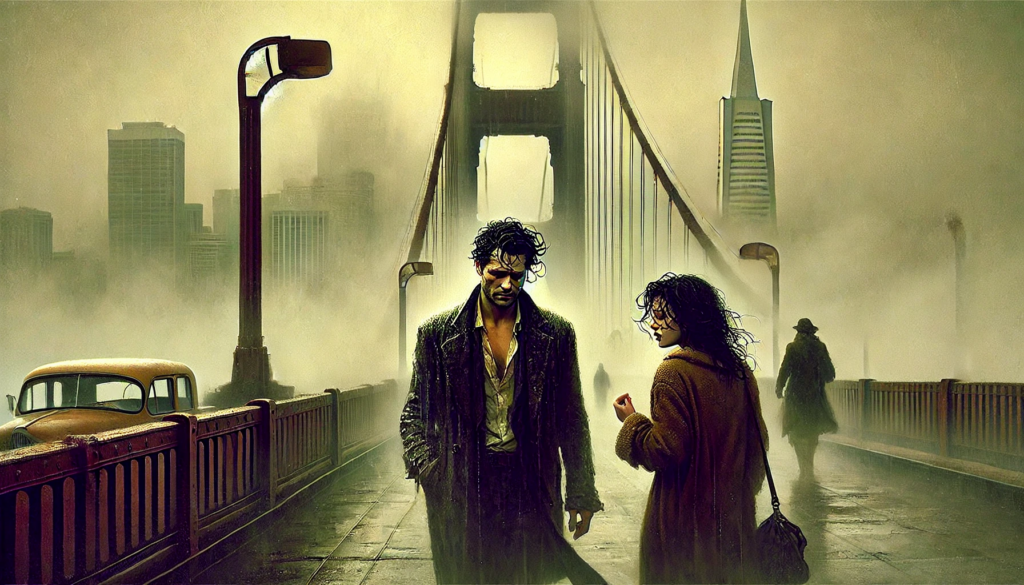City of Reckoning
San Francisco wasn’t what I thought it would be. The city felt foreign in the early morning light, all fog and muted colors, like the world itself wasn’t sure what to do with us. I was running on no sleep, running on fumes, running on him—and God, I was so fucking tired.
But he wasn’t. He was buzzing. The way he always was after we hit one of those highs. He jumped out of the car like the last twelve hours hadn’t happened, like we hadn’t almost killed each other on some rainy mountain road. He leaned back into the SUV, his hair still damp, his grin still cocky as ever, and said, “Let’s go.”
I stared at him. “Go where?”
He shrugged. “Anywhere. Everywhere.”
This was his specialty. That mix of spontaneity and carelessness that made me feel both free and completely untethered. I didn’t know if I wanted to follow him into the next adventure or punch him in the face. Maybe both.
But I didn’t argue. I never did, not really. I grabbed my bag, slammed the door, and followed him into the city like I always followed him—half desperate to keep up and half hoping he’d slow down.
We wandered for hours, winding through streets that smelled like sea salt and stale cigarettes. He talked about nothing and everything, throwing out half-baked plans and ridiculous ideas as if he could spin a new world out of thin air.
And I let him. Because when he talked like that, when he looked at me like I was part of his grand scheme, it made me forget everything else. The exhaustion, the fights, the way we seemed to be constantly tearing each other apart. None of it mattered when he was like this—alive and burning and pulling me into his orbit.
We ended up at the Golden Gate Bridge. He insisted on walking across it, even though the fog was so thick you couldn’t see more than a few feet in front of you. I told him it was stupid. He laughed and grabbed my hand, dragging me along anyway.
“Trust me,” he said, his fingers laced tightly with mine.
And I did. I always did.
The wind whipped around us, the kind of cold that cuts straight through you, but his hand was warm, steady. We walked in silence for a while, the fog swallowing us whole, until he stopped suddenly and turned to face me.
“You ever think about just… disappearing?” he asked, his voice softer than I’d ever heard it.
I frowned. “What do you mean?”
“Like, leaving everything behind. Starting over. Just… you and me.”
It was such a him thing to say—reckless, romantic, completely impractical. And for a second, I let myself imagine it. The two of us, driving off into some unknown future, leaving behind all the mess and the noise and the bullshit.
But I knew better.
“You can’t outrun yourself,” I said, my voice sharper than I meant it to be.
He looked at me for a long time, his eyes searching mine like he was trying to figure out if I meant it. Then he smiled, that crooked, infuriating smile that always felt like a challenge.
“Watch me,” he said.
And maybe that was the problem. He was always running—from the world, from himself, from me. And I was always chasing, trying to catch up, trying to hold onto something that was never really mine to hold.
We stayed in San Francisco for two days. Two days of highs and lows, of stolen kisses and shouted arguments, of feeling like we were invincible and on the verge of collapse all at once.
There was a moment, though—a rare, quiet moment that stayed with me long after the trip was over. We were lying on the hood of the SUV, parked on some overlook that he’d found by accident, the city lights spread out below us like a postcard. The air was cool, the kind of cool that makes you want to stay close, and for once, he wasn’t fidgeting or talking or trying to distract me.
He was just there.
I turned my head to look at him, and he caught me staring.
“What?” he asked, his voice low, almost shy.
“Nothing,” I said, even though it wasn’t nothing. Even though I wanted to tell him that this was the version of him I loved the most—the one who didn’t need to fill the silence, the one who let me see the cracks he usually tried so hard to hide.
But I didn’t say it. Because with us, the unspoken always said more than the words ever could.
